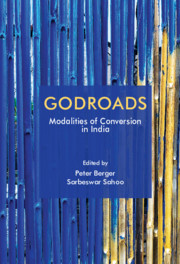Book contents
- Frontmatter
- Contents
- Foreword
- Acknowledgements
- Introduction
- 1 The Rise, Growth and Significance of Shudra Conversion Movements in the Methodist Mission, Hyderabad, 1925–1947
- 2 Communism and the Cross: A Caste–Class Trajectory of Religious Conversion in South India
- 3 Religious Conversion as Ethical Transformation: A Study of Islamic Reformism in Rural West Bengal
- 4 Conversion versus Unity: The Basel Mission among the Badaga on the Nilgiri Plateau, 1845–1915
- 5 Identity Change and the Construction of Difference: Colonial and Postcolonial Conversions among the Sumi Naga of Nagaland, Northeast India
- 6 Conversion to Christianity and Healing: The Naga of Northeast India
- 7 Reshaping the American Evangelical Conversion Narrative in Nineteenth-Century North India
- 8 Cultural Transformations through Performance Arts in Early Twentieth-Century South India
- 9 Reservation and Religious Freedom: Understanding Conversion and Hindu–Christian Conflict in Odisha and Rajasthan
- 10 Rupture and Resilience: Dynamics between a Hindu Reform Movement and an Indigenous Religion in Highland Odisha
- Afterword: India Seen from Amazonia
- About the Contributors
- Index
2 - Communism and the Cross: A Caste–Class Trajectory of Religious Conversion in South India
Published online by Cambridge University Press: 24 April 2020
- Frontmatter
- Contents
- Foreword
- Acknowledgements
- Introduction
- 1 The Rise, Growth and Significance of Shudra Conversion Movements in the Methodist Mission, Hyderabad, 1925–1947
- 2 Communism and the Cross: A Caste–Class Trajectory of Religious Conversion in South India
- 3 Religious Conversion as Ethical Transformation: A Study of Islamic Reformism in Rural West Bengal
- 4 Conversion versus Unity: The Basel Mission among the Badaga on the Nilgiri Plateau, 1845–1915
- 5 Identity Change and the Construction of Difference: Colonial and Postcolonial Conversions among the Sumi Naga of Nagaland, Northeast India
- 6 Conversion to Christianity and Healing: The Naga of Northeast India
- 7 Reshaping the American Evangelical Conversion Narrative in Nineteenth-Century North India
- 8 Cultural Transformations through Performance Arts in Early Twentieth-Century South India
- 9 Reservation and Religious Freedom: Understanding Conversion and Hindu–Christian Conflict in Odisha and Rajasthan
- 10 Rupture and Resilience: Dynamics between a Hindu Reform Movement and an Indigenous Religion in Highland Odisha
- Afterword: India Seen from Amazonia
- About the Contributors
- Index
Summary
Sometimes a road leads to unexpected destinations, for instance, from communism to Christianity. This chapter investigates the conditions and implications of this unforeseen journey as it explores the rather distinct trajectory of religious conversion to argue that communist activism indubitably nurtured the seeds of caste consciousness which, over time, contributed to the growth of Christianity in Andhra Pradesh. The arguments are developed in the light of ethnographic data collected from the Lutheran community of Dravidapuram village in Guntur district of coastal Andhra, south India. To unfold this distinctive trajectory of conversion to Christianity, one needs to historically examine communist activism in coastal Andhra with special reference to local politics, especially politics of the lower castes. Often, local politics is seen as a significant platform wherein caste and class, as dominant categories of mobilisation, interact with and feed into each other in many ways. In this particular case, the local politics of coastal Andhra paved the way for the consolidation of class and caste consciousness. In turn, the Lutheran community produced syncretic Christian practices that in many ways communicate symbolic meanings from its own historical trajectory.
The idea of religious conversion is no longer viewed as a sudden shift from one belief system to another but as a complex process that accommodates converts’ sociopolitical motives and aspirations. In the Indian context, perhaps the most viable and comprehensive academic explanation of conversion is that it is a fluid process of changing affiliations of religious beliefs and traditions, as it can then theoretically accommodate accounts of shifting sectarian affiliations within Hinduism as well as conversion to Islam and Christianity (Robinson and Clarke 2003). To understand these processes of changing affiliations of religious beliefs, one has to pay careful attention to the social, political and historical contexts of conversion. How fluid these processes are depend largely upon the historical trajectories it travelled through. In making sense of syncretic practices and contextual meanings, the trajectory of conversion – the multiplicity of factors affecting the journey down the godroad – is as significant as the individual act of conversion.
Since the nineteenth century, the lower castes, especially former ‘untouchables’ – who came to self-identify as Dalit in modern India – have invariably been distinct in terms of their public protest against structures of caste discrimination allegedly legitimised by the Hindu religious faith.
- Type
- Chapter
- Information
- GodroadsModalities of Conversion in India, pp. 68 - 84Publisher: Cambridge University PressPrint publication year: 2020

